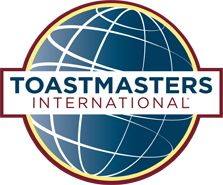Key Roles in a Toastmaster’s Meeting
At our meetings, members have the opportunity to take on a variety of roles to ensure the evening is conducted smoothly. Each role provides members with valuable experiences and skills that can be applied in real world situations.
 Toastmaster
Toastmaster
The Toastmaster of the evening hosts and conducts the meeting, and is responsible for introducing all the various speakers and roles takers. The Toastmaster will also provide smooth transitions between speakers during the meeting. Prior to the event, the Toastmaster will review the agenda with the Vice President of Education to ensure that all speakers, evaluators and those taking formal roles for the evening are confirmed. This ensures that the Toastmaster can check that everyone knows what they are doing on the evening, and to help organise any changes if a speaker cannot attend or has not prepared the speech.
Learning opportunity: Many of us at various times of our lives and careers will be in a position of introducing others at a conference, training day or social event. Coordinating a whole evening is harder than it looks, and although it is different to prepared speeches, this role develops confidence in facilitation.
Grammarian
The Grammarian has a number of responsibilities at a Toastmasters meeting, including providing a “word of the day”. This allows members to build their vocabulary, and attendees are challenged to try and use this word when they are speaking during the meeting. The Grammarian will also watch out for good use of phrases, descriptions or word usage, and will make a note of repetitive, excessive or unnecessary word usage (“in fact” “actually” “obviously” “you know”). At the end of the meeting, the Grammarian provides a report so attendees are aware of what they have done well and what they need to work on within their grammar.
Learning opportunity: to make yourself and other members more aware of the use of language in speaking, and to notice when others have particularly good or less than high quality signs of literacy and grammar. Becoming more aware of these issues can assist your own speaking performance.
Guide to the Role of Grammarian
Timer
The Timer is responsible for ensuring that the meeting runs on time. They do this by timing each item on the agenda including speeches, introduction of meeting roles, evaluations, and Table Topics speeches. The timer will also use traffic light cards to signal to a speaker when they have reached their minimum time, when they are halfway through their allotted time, and when a speaker should try, if possible, to finish their speech. This is an essential role within our meetings as it encourages members to speak within their time limits, and ultimately, be able to express a point within an allotted time frame. The Timer provides a report at the end of the meeting to make attendees aware of their own timings.
Learning opportunity: to gain an overall view of how an evenings event works time wise; to learn how timing (or lack of it) affects peoples speeches and the flow of a speech; to contribute to the overall smooth running of the evening. Even experienced speakers can benefit from doing this role from time to time – but it is also a good role for the beginner – perhaps as “assistant timekeeper”.
Guide for the Role of Timerkeeper
Ah Counter Role
The Ah Counter is responsible for noting and keeping track of words and sounds used to fill pauses when attendees are speaking throughout the meeting, often referred to as ‘crutch’ words or ‘filler’ sounds. Crutch words can include inappropriate interjections such as ‘and’, ‘well’, ‘but’, ‘so’, ‘like’, and ‘you know’. Filler sounds may be ‘ah’, ‘um’, ‘er’ and ‘erm’. The Ah Counter will also note when a speaker repeats a word or phrase often, such as ‘I’ or ‘this means’. During the meeting, if a member uses a crutch word or filler noise, the Ah Counter will press a buzzer, which provides speakers with an audible cue to make them aware of this without interrupting their speech. By drawing their attention to this, the speaker can then try to limit their use of filler words and noises for the remainder of their speech. The Ah Counter provides a report at the end of the meeting, allowing members to get an update on their progress.
Table Topics Master
The Table Topics Master is responsible for coordinating the Table Topics portion of the meeting, which is a part of the evening that develops impromptu speaking. The Table Topics Master prepares a number of topics or questions, such as “what is your biggest achievement?”, and will then call upon an attendee at random to answer this for 1-2 minutes. The Master describes how they will conduct the Table Topics and explains any theme they may have chosen. Guests and new members are particularly welcome to alert the Table Topics Master that they would like to participate. The Master tries where possible to select people to participate who have either not undertaken a formal role, or who are not giving speeches.
General Evaluator
The General Evaluator is responsible for evaluating the full meeting, including all those who have undertaken meeting roles, for example the speech evaluators, Toastmaster of the evening, and Timer. This role helps to conclude the meeting, and involves providing the group with an overview of the highlights and achievements praised, as well as areas in which we could all as a club or audience improve on. The General Evaluator will also provide feedback for those who have undertaken meeting roles for the evening. At the end of the meeting after all other reports, the General Evaluator will provide their evaluation of the evening before the Toastmaster formally closes the meeting.
